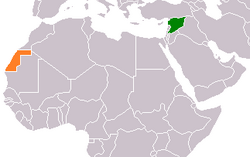 | |
Syria | Sahrawi Arab Democratic Republic |
|---|---|
SADR-Syrian relations refers to the current and historical relations between the Sahrawi Arab Democratic Republic (SADR) and Syria. Syria officially recognized SADR on 15 April 1980. [1]
 | |
Syria | Sahrawi Arab Democratic Republic |
|---|---|
SADR-Syrian relations refers to the current and historical relations between the Sahrawi Arab Democratic Republic (SADR) and Syria. Syria officially recognized SADR on 15 April 1980. [1]
Syria has historically provided political support to the Polisario, a Sahrawi group fighting against Morocco.